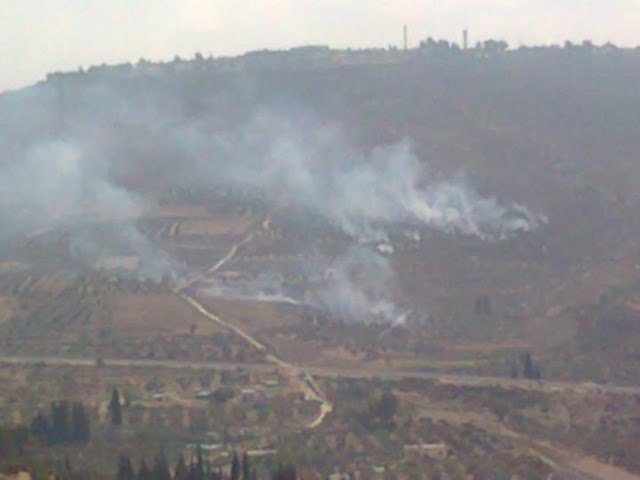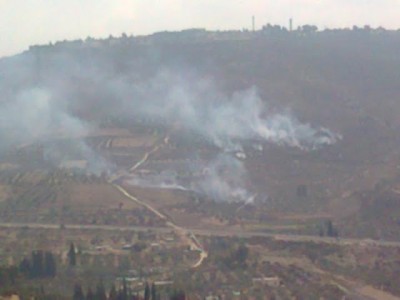1 September 2011 | International Solidarity Movement, West Bank
The army is establishing two virtual lines for each of the settlements that are near a Palestinian village. The first line, if crossed by Palestinian demonstrators, will be met with tear gas and other means for dispersing crowds.
The second line is a “red line,” and if this one is crossed, the soldiers will be allowed to open fire at the legs of the demonstrators, as is also standard practice if the northern border is crossed.
Each map was approved by the regional brigade commander, and the IDF force that is deployed to the area will be ready to respond on the basis of the lines determined.—Haaretz
Shortly after dawn on August 29th, with the soft light spreading across the hills, eight armed soldiers climb out of their military vehicle to watch sheep.
Na’il is unperturbed. He makes a clicking noise with his tongue and drives his flock a little further up the slope. The soldiers are on the opposite hill, visible against the brightening sky. They guard an illegal settlement from us – two Palestinian shepherds, two international activists, and a small battalion of sheep and goats.
In these hills, sheep farming is political. Rights to this land are re-enacted daily by grazing flocks. The sheep kick back the dusty earth to find short grasses and sparse roots; goats strip the sharp thorns from the scrub. Some days, the shepherds will hang back in the low fields. Others, they will push a little higher, a little further, a little closer towards the boundary.
The sheep do not look up as they scour the earth. The grass is no different here from there; no wall stops their wandering. It matters little to the sheep that up there, the land is claimed by Zionist settlers, who guard it with sticks and stones and guns; nor that the Zionist settlers say this land will one day all be theirs, promised to them by God. As the sheep search onwards for fresh pasture, they do not notice the soldiers on the hilltop; they do not sense the cautious glances of the shepherds; they know nothing of the Oslo Agreement or UN resolutions or international law. They chew the earth, swallowing it in sandy mouthfuls with the roots and the shrubs. It is fine, dry, powdery, physical. But the boundary – that is entirely imagined.
The boundary is not a place; it is a ritual. It cannot be seen in itself, but only in the behaviour it creates. Stray too close to the settlement, and the shepherds know they will meet a response. Today, the army is here – an alien force in an occupied land, frightened young men who came to fight terrorists and find themselves supervising shepherds. They watch, but they do not intervene. The shepherds are permitted to come this far, but no further.
But it is not the army that Na’il and Khaled are worried about. Soldiers can be brutal, but they are by and large ordered, pragmatic, predictable. The illegal settlers, by contrast, are zealous, fanatical. They follow no commands, only Commandments; they recognize no law, only the Law, the Torah, the eternal and unalterable word of God. An army sergeant who used to serve in these hills describes it as the Wild West: ‘the Arabs can be beaten up, the settlers are untouchable.’
Like the original Wild West, the settlers – the cowboys – are violent, lawless, appropriating the land of the native inhabitants through theft and assault. And like the original Wild West, mythologized by Hollywood, their story is retold in the Zionist press, the illegal settlers as bold pioneers and the Palestinians as irrational savages.
The shepherds’ gaze oscillates between the sheep and the settlement, alert to any approach from the self-appointed sheriffs. We are right on the boundary now; the ritual has begun. For about an hour, nothing happens. The soldiers watch us, we watch the soldiers. The only sound is the grinding of ovine teeth and Na’il quietly reciting verses from the Qur’an. With the sun now high in the eastern sky, the shepherds start to drive their sheep back to the fold. As we turn to leave, we see the soldiers climb back into their jeep and disappear over the horizon.
But we have crossed the boundary, and that is enough. With the soldiers gone, we see a lone figure coming down the hill from the settlement. He is moving quickly; in his left hand he is carrying a stick. He moves with purpose, following the contours around the valley. He is some way out of the settlement now.
He is coming towards us. Na’il points: ‘Mustawtan.‘ Settler.
We are now half a kilometer away from the settlement, but the illegal settler continues to follow us. We lose sight of him for a moment, then suddenly he appears over the brow of a hill. He approaches Abu, an Italian activist, shouting with rage. I thought for a moment he might hit Abu with the stick, but instead he pushes him, hard, and screams
“Nazi, Nazi, go!” Abu walks backwards slowly, and responds that he is Italian.
“Italia, Mussolini, fascist” shouts the settler, continuing to push him, shouting now right into his face. For these illegal settlers, anyone who denies their right to this land is a fascist, an anti-Semite, supporting the Arabs who they say stole this land from the Jews two thousand years ago.
“Fascist, go, now, now!”
And so the promises of scripture and the tragedies of twentieth century Europe are thrown together in a sense of entitlement, of indignation, of rage, in this dusty field in Palestine.
A few meters away, I film what happens; Na’il films too, on a video camera provided by the Israeli human rights organization B’Tselem. This is the only protection that these shepherds have – observation, recording, and the meticulous chronicling of truth. Rarely is justice served. But the knowledge that their actions may be known elsewhere sometimes gives the illegal settlers pause. The worst violence takes place when cameras are not there. Today, the settler goes no further. Perhaps the presence of cameras makes a difference. After a few minutes he turns and storms off, marching in long strides across the stony ground. He shouts insults at the shepherds as he leaves, which they shout back in turn.
Back in Khaled’s tent we stretch out on thin mattresses and rest. He speaks no English and I only understand a few words of Arabic; we talk with our hands and our faces, in gestures. He pulls up his shirt to show a scar from a bullet wound on his belly – this is what can happen, sometimes, this is why the settlers are feared, this is why he brings cameras and foreigners to help him graze his sheep. Usually, he says, six illegal settlers come down, threatening and sometimes attacking the shepherds, guarding the land that is not theirs to guard. This is how the land is stolen; not in a grand historical moment, but in increments, dunam by dunam, hilltop by hilltop, the imagined boundary moving a little further each day.
Olive branches strike against the car window as we take the bumpy track back to Yatta. We take this detour through the olive groves because the main track has been blocked, a giant rock pushed across the route by illegal settlers. The straight, smooth illegal settler road bisects the landscape; it, too, is a kind of boundary. Palestinians near the settler road attract attention, Musa tells us, as he maneuvers his car across a stony field. The tarmac stretches away into the distance, a sign in Hebrew and English pointing the way to the Israeli town of Be’er Sheva. Cars and trucks with Israeli plates speed up this road in Palestine. The Promised Land turns beneath their wheels.
The rumble of the trucks can be heard from the tents, where the shepherds wait out the hot noon hours until it is time to take the sheep out again. As the sun drops in the West, and the women begin to prepare the iftar meal to break their Ramadan fasts, they will drive their sheep up the hill once more, towards the boundary. They will keep going back, because it is the only way to live like this, on their land, all of it their land. Like connoisseurs of the absurd, they wait for the invisible boundary to disappear, as Khaled mutters:
“Kul yom. Kul yom. Kul yom.”
Everyday, everyday, everyday.


